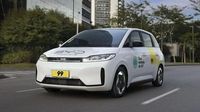DiDi, an online ride-hailing service akin to Uber, is making a significant move in the electric vehicle (EV) landscape by committing to deliver over 100,000 electric cars to Mexico by the year 2030. This ambitious initiative is part of DiDi's broader strategy to electrify its fleet and combat carbon emissions in urban areas.
The vehicles slated for this rollout will come from reputable brands such as Deepal, GAC, and BYD. Users in Mexico will be able to hail these electric cars through the DiDi app, which directly competes with Uber Mexico. This expansion into electric vehicles is not only a business strategy but also a response to increasing environmental concerns.
According to DiDi Mexico, the transition from traditional combustion engine vehicles to electric ones is projected to reduce carbon dioxide emissions by over 70 percent, equating to a staggering 500,000 tons by the decade's end. To put this into perspective, this reduction is comparable to the environmental benefit of planting approximately 8.5 million trees.
DiDi's plans extend beyond Mexico; the company is also enhancing its presence in Brazil, where it has been operational since 2018. In Brazil, DiDi aims to construct more than 10,000 charging stations for electric vehicles, further solidifying its commitment to supporting the EV ecosystem. This project will be managed by 99 Travel, a local subsidiary acquired by DiDi, which is responsible for taxi services in the region.
As of the end of 2023, DiDi reported having over four million registered "new energy" vehicles (NEVs) in its fleet, with approximately 3.5 million being fully electric. Notably, electric vehicles accounted for over 57 percent of the total mileage driven by DiDi's vehicles, showcasing a significant shift towards sustainable transportation.
DiDi's commitment to electrification comes at a time when Mexico has emerged as the largest importer of cars from China. In the first two months of 2025 alone, nearly 86,000 Chinese cars were imported into Mexico, surpassing both Russia and the United Arab Emirates, which previously held leading positions in car imports.
In the previous year, DiDi completed an impressive 3.6 billion orders, with transactions totaling 91.3 billion yuan. This robust performance highlights the company's significant role in the ride-hailing market and its potential influence in promoting electric vehicles.
As the global conversation around climate change intensifies, DiDi's initiatives reflect a broader trend in the transportation industry towards sustainability. Last summer, Uber also announced a similar program, pledging to transition 100,000 of its drivers to BYD electric vehicles, providing incentives for maintenance, charging, and financing. This indicates a growing commitment among ride-hailing companies to embrace electric vehicles, particularly in Europe and Latin America.
The implications of these shifts are profound, as the electrification of taxi services could lead to significant reductions in urban air pollution and greenhouse gas emissions. With cities grappling with the impacts of climate change, initiatives like those from DiDi and Uber could play a crucial role in shaping a more sustainable future.
In conclusion, DiDi's plans to introduce over 100,000 electric vehicles to Mexico by 2030 not only signify a pivotal moment for the company but also represent a significant step forward in the global transition towards electric mobility. As cities around the world seek to reduce their carbon footprints, the actions of companies like DiDi will be instrumental in driving change and fostering a cleaner, greener future.





